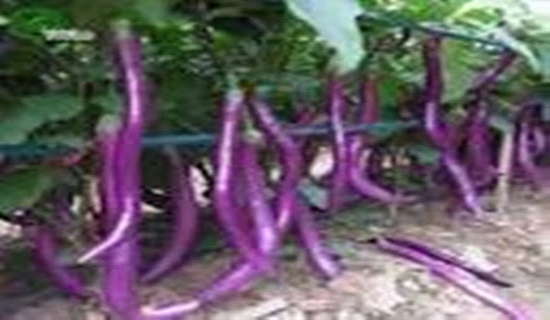Most of us are very familiar with eggplant. It is often called the ‘king of vegetables’. Eggplant is also known as aubergine and melogin. In South and South-East Asia it is usually known as Brinjal. It is believed that brinjal originated in India. Also, it was cultivated in China for around 1500 years. Brinjal signs in India are probably found since prehistoric times. It is a low calorie vegetable in the Mediterranean diet.
Brinjal is a tropical perennial plant and grows best in a temperate climate. Brinjal is actually a fruit because it contains seeds. But brinjal is always used as a vegetable. Eggplant grows best in warm climates. But also the best suited for the cultivation of this vegetable is Alkaline soil.
There are many varieties of brinjal which are small, long, thin, round in shape and purple, red, green and white in color.
Eggplant contains a good amount of calories as well as vitamins, minerals and fiber which are beneficial for our health.
Nutrients found in 100 grams of brinjal juice

Calories 25
Fat 0.2 g
Carbohydrate 6 grams
protein 1 gram
Fiber 4 grams
vitamins and minerals
Vitamin C 3%
vitamin K 4%
Vitamin B6 5%
Magnesium 3%
Manganese 10%
Potassium 229 mg
Sodium 2 mg
Iron 1%
In addition to containing a variety of vitamins and minerals, eggplants contain a high amount of antioxidants. Antioxidants are substances that help protect the body from harm from harmful substances.
Health benefits of Brinjal
Brinjal is a high-fiber, low-calorie food rich in nutrients and is helpful in many potential health benefits. Including brinjal in your diet can help keep blood sugar under control because eggplant is high in fiber and low in soluble carbohydrates. Fiber can reduce blood sugar by slowing the rate of digestion and absorption of sugars in the body. Slow absorption keeps blood sugar levels stable.
Eggplant can help in weight loss. Eggplants are high in fiber but low in calories, both of which can help with weight loss. It can also be used in place of high-calorie.
Brinjal contains many substances that show ability to fight cancer cells. Solasodine rumnosyl glycoside (SRG) is a type of compound found in brinjal plants. One study suggests that solasodine rumnosyl glycosides may aid in the treatment of cancer.

Polyphenols present in brinjal can help protect the body from cancer. These are helpful in fighting the effects of cancer. Anthocyanin and chlorogenic acid protect cells from free radical damage. In the long term, it can help prevent tumor growth and the spread of cancer cells. It also helps prevent the cancer-causing enzyme.
The fiber found in brinjal stimulates the secretion of gastric juice. this gastric juice helps our body to easily digest food and absorb nutrients.
Improves cardiovascular health while helping to reduce the risk of heart disease. The fiber, potassium, vitamin C, vitamin B6 and antioxidants in brinjal all help to keep the heart healthy.
It strengthens bones and prevents the onset of osteoporosis. Rich in Vitamin-K and copper, eggplant helps prevent osteoporosis, increases bone strength and also increases mineral density. The collagen present in it helps in building connective tissue and helps in absorbing potassium, calcium which makes bones healthy and strong.
Brinjal, being a rich source of iron, helps in fighting the symptoms of anemia.
Gervavati helps protect infants from birth defects in women. Folate found in it helps in the development of the brain of the infant.
The compounds found in brinjal help eliminate harmful particles in our body and protect our cells.
Vitamin-C present in eggplants stimulates the production of white blood cells (WBC), which protects our body from infection.
Brinjal is a source of phytonutrients, which helps to increase mental capacity and brain health. They help our brain to get oxygen rich blood and help to develop nervous pathways. Which improves our memory and ability to think analytically.
Eggplant also contains potassium which is a vasodilator and is important for the proper functioning of our brain.
It also contains copper which together with iron helps to increase red blood cells (RBC). Fatigue decreases. It also reduces stress levels.
Eggplant skin has many nutritional benefits. It is phenolated which helps eliminate free radicals in our body. It is better to eat boiled brinjal.

Bad Effects
Consuming a large amount of brinjal vegetable can have some harmful effects on the body. Nasunin present in brinjal is a phytochemical that can absorb iron and remove it from the body.
Eggplants contain oxalates. Oxalates can cause kidney stones. Eggplants are not suitable for people with kidney stones.
Eggplant belongs to the nightshade family of vegetables and when taken in large quantities may cause allergies in some people. These symptoms may include hives, swelling, and difficulty breathing.
Too much brinjal should not be consumed. Nightshades found in eggplants contain alkaloids, including solanin, which can be toxic.
Eating leaves or tubers of these plants can cause symptoms like throat irritation, nausea and vomiting. The reaction can be fatal.
